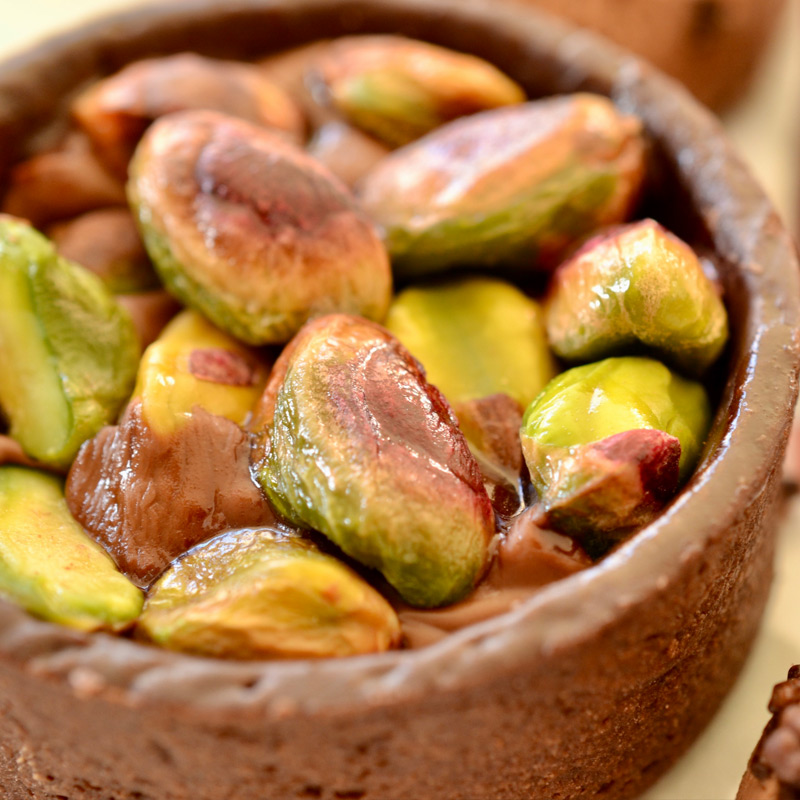
100 gr |
-- |
|
|---|---|---|
| Carbohydrate (gr) | 15.04 |
4928.47 |
| Protein (gr) | 3.59 |
1176.23 |
| Fat (gr) | 12.46 |
4083.43 |
| Fiber (gr) | 1.36 |
445.97 |
| Cholesterol (mg) | 14.64 |
4795.8 |
| Sodium (mg) | 325.27 |
106557.75 |
| Potassium (mg) | 392.16 |
128471.4 |
| Calcium (mg) | 78.15 |
25603.27 |
| Vitamin A (mg) | 46.04 |
15084.01 |
| Vitamin C (mg) | 6.16 |
2019.31 |
| Iron | 0.62 |
203.1 |
Pistachios are rich in protein, healthy fats, vitamins A and B, potassium, phosphorus, and fiber. This nutrient profile makes pistachios beneficial for heart health and blood sugar regulation.
100 grams of pistachios contain about 572 calories.
Research published in the American Journal of Clinical Nutrition shows that pistachios help lower LDL (bad cholesterol). In a study, 28 adults with high LDL levels followed three different diets: a low-fat diet without pistachios, a diet with one serving of pistachios, and another diet with two servings. Those who consumed pistachios saw a notable reduction in LDL, a significant factor for heart health.
Pistachios are high in lutein and zeaxanthin, key carotenoids found in the retina and lens of the eye. Studies show that diets rich in these carotenoids may reduce the risk of age-related macular degeneration and cataracts. Since these carotenoids are better absorbed with fat, pistachios—which contain healthy fats—improve the body’s absorption, supporting better eye health as we age.
Pistachios are an excellent snack for weight management due to their protein, fiber, and healthy fats, which help keep hunger at bay. A study by UCLA found that replacing less healthy snacks with pistachios, even when they contributed to 20% of daily calories over three weeks, did not lead to weight gain. Additionally, participants saw an increase in HDL (good cholesterol) and a reduction in total cholesterol.
Research from the Ataturk Teaching and Research Hospital in Turkey indicates that pistachios may improve male sexual function. In a study, men with erectile dysfunction (ED) consumed 100 grams of pistachios daily for three weeks, contributing 20% of their daily calories. They experienced improvements in erectile function and blood lipid levels, likely due to pistachios’ high arginine content. This amino acid increases nitric oxide production, enhancing blood flow and blood vessel flexibility.
A 2015 study at Penn State University examined the effects of daily pistachio consumption on adults with type 2 diabetes. While pistachios did not directly affect blood sugar levels, they positively impacted cholesterol ratios, helping improve lipid profiles and reducing cardiovascular risks linked to diabetes. For diabetics, regular pistachio intake can be part of a heart-healthy diet.
Pistachios, like others in their botanical family (e.g., cashews, mangoes), contain urushiol, a compound that can cause allergic reactions. Additionally, excessive pistachio consumption can lead to issues such as weight gain, high blood pressure, and digestive discomfort. Salted pistachios, in particular, increase sodium intake, potentially leading to high blood pressure; half a cup of salted pistachios adds 263–526 mg of sodium.
Pistachios are a powerful food with diverse health benefits, from supporting heart and eye health to aiding weight management and sexual health. While they can be a valuable addition to a balanced diet, consuming them in moderation, particularly avoiding salted varieties, can help prevent potential adverse effects.